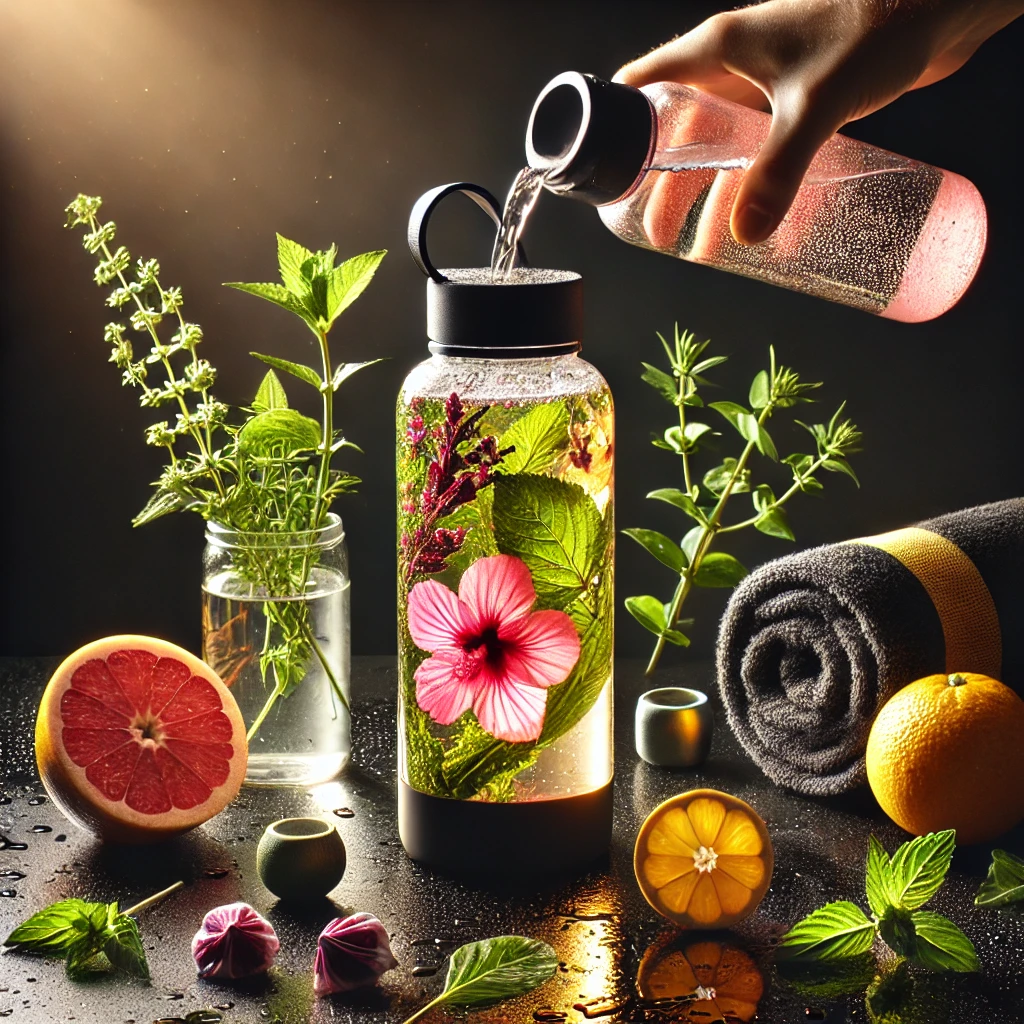Hydration & Performance: Why Herbal Drinks Matter in Fitness

Share
Introduction
You’ve probably heard the phrase "hydrate or die-drate"—but proper hydration goes beyond just drinking water. Your hydration strategy can directly impact endurance, recovery, and overall performance.
While sports drinks are often marketed as the best option, herbal drinks offer a natural way to enhance hydration while delivering extra benefits like electrolytes, antioxidants, and inflammation reduction.
So, how do herbal drinks compare to water and sports drinks? And which ones actually improve fitness performance? Let’s break it down.
1. The Link Between Hydration & Athletic Performance
Dehydration as little as 2% of body weight can lead to:
🚨 Reduced endurance – Slows oxygen and nutrient delivery to muscles.
🚨 Weakened strength & power – Muscles contract less efficiently (Judelson et al., 2007).
🚨 Slower recovery – Dehydration increases soreness and delays muscle repair.
🚨 Cognitive decline – Poor hydration affects focus and reaction time.
📌 The takeaway? Hydration isn’t just about thirst—it directly impacts performance and recovery.
2. Why Herbal Drinks Matter for Hydration
Water is essential, but it lacks electrolytes, antioxidants, and performance-boosting compounds. Herbal drinks provide:
✅ Electrolytes – Sodium, potassium, magnesium for fluid balance.
✅ Anti-inflammatory compounds – Reduce muscle soreness.
✅ Digestive support – Helps nutrient absorption for better recovery.
✅ Sustained energy – Natural alternatives to caffeine-based pre-workouts.
📌 The result? Faster recovery, better hydration, and improved performance.
3. The Best Herbal Drinks for Hydration & Performance
🏆 1. Coconut Water with Hibiscus – The Natural Electrolyte Booster
🔥 Rich in potassium, magnesium, and sodium – Essential for hydration.
🔥 Hibiscus adds antioxidants & supports blood circulation (Hopkins et al., 2013).
🔥 Better than sports drinks – No artificial sugars or additives.
💡 Best use: Drink post-workout to replenish electrolytes naturally.
🏆 2. Ginger & Lemon Water – The Anti-Inflammatory Hydrator
🔥 Ginger reduces muscle soreness by up to 25% (Black et al., 2010).
🔥 Lemon provides vitamin C & enhances hydration.
🔥 Aids digestion, helping absorb post-workout nutrients.
💡 Best use: Drink pre or post-workout for inflammation control.
🏆 3. Peppermint Tea – The Endurance Enhancer
🔥 Boosts oxygen efficiency, improving stamina (Meamarbashi & Rajabi, 2013).
🔥 Reduces perceived exertion, making workouts feel easier.
🔥 Aids digestion & muscle relaxation.
💡 Best use: Drink before endurance workouts for better breathing and stamina.
🏆 4. Green Tea – The Metabolism & Performance Booster
🔥 Contains EGCG, which enhances fat oxidation (Venables et al., 2008).
🔥 Mild caffeine boost without the jitters.
🔥 Loaded with antioxidants for recovery.
💡 Best use: Drink 30 minutes before workouts for a metabolism boost.
🏆 5. Nettle Tea – The Muscle & Joint Protector
🔥 Rich in calcium, magnesium, and iron – Crucial for muscle function.
🔥 Supports blood circulation, delivering nutrients to muscles.
🔥 Anti-inflammatory properties reduce soreness.
💡 Best use: Drink daily for long-term recovery & hydration support.
4. How to Incorporate Herbal Hydration into Your Routine
🚀 For rehydration: Coconut water + hibiscus.
🔥 For endurance: Peppermint or Green tea before training.
💪 For muscle recovery: Ginger & Nettle tea post-workout.
💡 Hydration strategy tips:
✅ Drink 500ml before workouts for better endurance.
✅ Sip herbal teas throughout the day to support recovery.
✅ Use herbal drinks instead of sugary sports drinks.
📌 The key? A hydration plan tailored to your activity level & fitness goals.
Conclusion: Are You Hydrating for Performance or Just Drinking Water?
🚀 Want better endurance? Try Peppermint or Green Tea.
🔥 Struggling with soreness? Ginger & Nettle Tea can help.
💪 Need an electrolyte boost? Coconut water + Hibiscus is your best bet.
📌 Final Thought: Hydration isn’t just about drinking water—it’s about optimising fluid intake with electrolytes, antioxidants, and herbal benefits for peak performance.
References
- Black, C. D., Herring, M. P., Hurley, D. J., & O'Connor, P. J. (2010). "Ginger reduces muscle pain caused by eccentric exercise." The Journal of Pain, 11(9), 894-903.
- Hopkins, A. L., Lamm, M. G., Funk, J. L., & Ritenbaugh, C. (2013). "Hibiscus sabdariffa L. in the treatment of hypertension and hyperlipidemia." Fitoterapia, 85, 84-94.
- Meamarbashi, A., & Rajabi, A. (2013). "The effects of peppermint on exercise performance." Journal of the International Society of Sports Nutrition, 10(1), 15.
- Venables, M. C., Hulston, C. J., Cox, H. R., & Jeukendrup, A. E. (2008). "Green tea extract ingestion, fat oxidation, and glucose tolerance in healthy humans." The American Journal of Clinical Nutrition, 87(3), 778-784.
